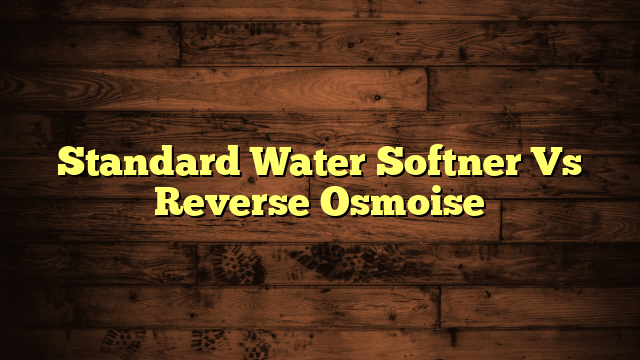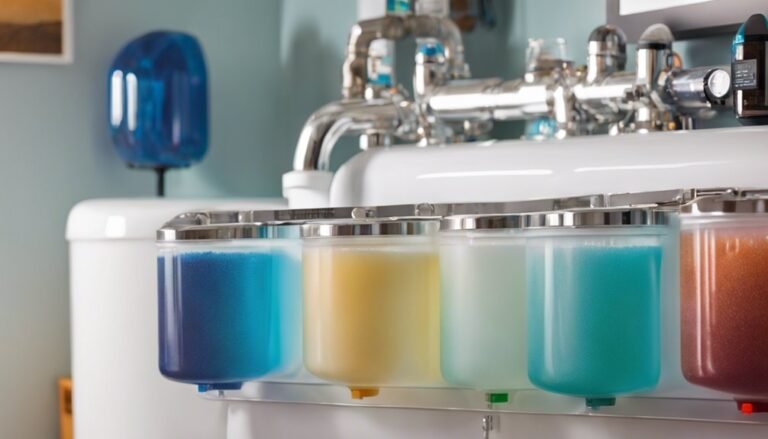Does a Water Softner Make Water Drinkable?
Did you know that nearly 85% of U.S. households experience hard water issues? While a water softener effectively reduces hardness by removing calcium and magnesium, it doesn't necessarily guarantee that your water is safe to drink. This raises an important question: is softened water truly drinkable, or are there hidden concerns you should be aware of? Exploring the nuances between softening and filtration can help clarify the situation and guide your decisions about water quality.
Key Takeaways
- Water softeners specifically target hardness minerals, improving water quality but not necessarily ensuring its safety for drinking.
- Softened water may contain increased sodium or potassium, which could concern individuals on low-sodium diets.
- While softened water enhances the taste for some, it may have a flat or bland flavor due to the absence of calcium and magnesium.
- Filtration systems are recommended in conjunction with water softeners to remove contaminants for safe drinking water.
- Consultation with healthcare professionals is advised for individuals with specific health concerns regarding softened water consumption.
What Is a Water Softener?
A water softener is a device designed to remove minerals like calcium and magnesium from your water supply. These minerals can cause hard water, which negatively impacts your water quality. When you have hard water, you might notice scale buildup on faucets, spots on dishes, or soap that doesn't lather well.
By using a water softener, you can greatly reduce the mineral content in your water, leading to a smoother, cleaner experience.
Softened water feels better on your skin and can prolong the life of your plumbing and appliances. It also makes cleaning easier, as soap and detergents work more effectively in softened water. You might be surprised to learn how much of a difference it can make in your daily routine.
While water softeners improve your water quality, it's essential to mention that the process involves replacing calcium and magnesium ions with sodium or potassium ions.
This change can affect the taste and overall drinkability of your water. If you're considering a water softener, it's a good idea to weigh the benefits against your preferences for taste and health.
How Water Softeners Work
Water softeners operate by utilizing a process called ion exchange, which effectively removes hard water minerals from your supply. This process is fundamental to understanding water chemistry, as it transforms hard water—rich in calcium and magnesium—into softer water. During ion exchange, hard minerals are swapped for sodium ions, making your water gentler on appliances and plumbing.
Here's a breakdown of the ion exchange process:
| Step | Description | Result |
|---|---|---|
| 1. Hard Water | Water enters the softener containing calcium/magnesium | High mineral content |
| 2. Ion Exchange | Water flows through resin beads coated with sodium | Calcium/magnesium removed |
| 3. Softened Water | Sodium ions replace hard minerals | Softer water produced |
| 4. Regeneration | Softeners flush out minerals, replenishing sodium | System ready for use again |
Benefits of Water Softeners
Water softeners offer several key benefits that can enhance your daily life.
By reducing hardness minerals in your water, these systems not only improve the taste but also help your appliances last longer.
You'll notice fewer mineral deposits on your dishes and fixtures, making maintenance a breeze.
Reduces Hardness Minerals
Hardness minerals, primarily calcium and magnesium, can greatly affect your water quality and overall home systems. When these minerals accumulate, they lead to scale buildup in pipes and appliances, which can cause blockages and reduce efficiency. By installing a water softener, you'll effectively reduce these hardness minerals, resulting in noticeably improved water quality.
You'll find that softer water not only feels better on your skin but also allows soap and detergents to lather more effectively. This means less soap is needed for cleaning, which is both economical and environmentally friendly.
Furthermore, if you enjoy cooking or brewing coffee, you'll notice that softer water enhances the taste of your beverages, making them more enjoyable.
Moreover, reducing the hardness minerals in your water can lead to fewer issues with laundry. Clothes washed in soft water come out cleaner and feel softer, while colors remain vibrant for longer.
Improves Appliance Longevity
Reducing hardness minerals not only enhances your water quality but also greatly improves the longevity of your appliances.
When you use a water softener, you're investing in appliance maintenance that pays off over time.
Here are some longevity benefits you'll notice:
- Reduced Scale Buildup: Softened water minimizes scale deposits in your appliances, allowing them to function more efficiently.
- Extended Lifespan: Appliances like dishwashers and water heaters last longer, as they're less prone to damage from hard water.
- Improved Performance: Your appliances will operate better, leading to lower energy bills and fewer repairs.
- Less Frequent Maintenance: With reduced mineral buildup, you'll spend less time and money on maintenance and repairs.
Differences Between Softening and Filtration
When you think about water treatment, it's crucial to understand that softening and filtration serve different purposes.
Softening primarily targets hard minerals like calcium and magnesium, while filtration removes contaminants and impurities from your water.
Purpose of Softening
Water softening and filtration serve distinct purposes in enhancing water quality. While both processes improve your water, they focus on different contaminants. Understanding the purpose of softening can help you make informed decisions about your water treatment needs.
Here are the primary goals of the softening process:
- Mineral Removal: Softening primarily targets hard minerals like calcium and magnesium, which can cause scale buildup in pipes and appliances.
- Improved Soap Efficiency: By removing these minerals, soft water enhances the effectiveness of soaps and detergents, leading to cleaner dishes and laundry.
- Reduced Skin Irritation: Soft water is gentler on your skin, which can be beneficial for individuals with sensitive skin or conditions like eczema.
- Extended Appliance Lifespan: With less scale buildup, your appliances, such as water heaters and dishwashers, can operate more efficiently and last longer.
In contrast to filtration, which eliminates particles, bacteria, and chemicals, the softening process is solely focused on mineral removal.
This targeted approach guarantees that your water is gentler and better suited for daily use, but it doesn't necessarily mean it's drinkable without further treatment.
Filtration Methods Explained
Understanding the differences between filtration and softening methods is essential for achieving ideal water quality. While both processes improve water, they serve distinct purposes.
Water softeners primarily target hard minerals like calcium and magnesium, using ion exchange to replace them with sodium ions. This method prevents scale buildup but doesn't eliminate contaminants or pathogens.
On the other hand, filtration systems focus on removing impurities from water. These systems employ various purification techniques, such as activated carbon filters, reverse osmosis, or UV treatment. Each method varies in effectiveness, addressing different types of contaminants, including chlorine, sediment, and bacteria.
For instance, activated carbon is excellent for improving taste and odor, while reverse osmosis can remove dissolved solids and heavy metals.
When you choose between these options, consider what you want to achieve. If your primary concern is hard water issues, a softener might be your best bet. However, if you're worried about contaminants, a filtration system is the way to go.
Water Quality Comparison
Comparing water quality from softening and filtration processes reveals significant differences that can impact your overall health and home.
While both methods aim to improve water quality, they tackle distinct issues, particularly concerning water contamination and mineral deposits.
Here's a quick breakdown of their differences:
- Water Softening: Primarily removes hard minerals like calcium and magnesium, preventing mineral deposits that can damage plumbing and appliances.
- Filtration: Targets contaminants such as bacteria, chemicals, and sediments, ensuring your water is safe to drink and use.
- Taste and Odor: Softened water may taste different due to higher sodium levels, while filtration can enhance the overall taste and smell by removing unwanted particles.
- Health Considerations: If your water source has contaminants, filtration is vital for safety, whereas softening is more about comfort and appliance longevity.
Understanding these differences helps you choose the right system for your needs.
If you're concerned about water quality, consider both methods.
After all, safe and pleasant drinking water is essential for your health and well-being.
Can Softened Water Be Drinkable?
Drinking softened water often raises questions about its safety and taste. You might wonder if it's safe to drink water that's been treated with a water softener. Generally, softened water is deemed safe for drinking. The primary process involves replacing hard minerals, like calcium and magnesium, with sodium or potassium ions. This doesn't introduce harmful contaminants, but it can affect the sodium content in your water.
If you're watching your sodium intake, you may want to take this factor into account. While the amount of sodium added is usually minimal, it could be a concern for those on strict dietary restrictions. Nevertheless, most people can enjoy softened water without worrying about drinking safety.
It's important to note that softened water can also be beneficial for your plumbing and appliances, potentially extending their lifespan.
However, if you're still hesitant or have specific health concerns, you might want to consult with a healthcare professional or think about using a reverse osmosis system for drinking water. Ultimately, the choice is yours, but understanding the basics can help you make an informed decision about whether softened water is right for you.
Impact on Water Taste
Softened water can noticeably alter the taste, which is something many people consider when deciding whether to drink it. You might find that the water flavor changes due to the reduction of certain minerals.
Here's how softened water can affect your taste experience:
- Sodium Increase: Softening often replaces calcium and magnesium with sodium. This can give the water a slight salty taste.
- Mineral Balance Shift: The removal of hard minerals might make the water taste flat or bland, lacking the richness some prefer.
- Taste Sensitivity: People are sensitive to changes in flavor, so you might notice the difference more than others.
- Personal Preference: Ultimately, your enjoyment of softened water depends on your taste buds. Some love it, while others might not.
In short, if you're considering a water softener, you'll want to think about how these changes in mineral balance might affect your overall drinking experience.
Taste is subjective, so it's worth trying softened water to see how it fits your palate.
Health Considerations
When it comes to health considerations, many people wonder about the implications of consuming softened water. One primary concern is the potential health risks associated with the sodium used in most water softeners. While the sodium levels may not be harmful for most people, individuals on low-sodium diets, like those with hypertension, might need to pay extra attention to their softened water intake.
Moreover, it's essential to evaluate the mineral balance in your body. Water softeners typically replace calcium and magnesium ions with sodium. While these minerals are important for various bodily functions, the absence of calcium and magnesium in softened water might lead to deficiencies over time, especially if your dietary intake is also low.
If you're relying solely on softened water for hydration, you may want to reassess your overall mineral intake from food sources or supplements.
Ultimately, while softened water is generally safe to drink, being mindful of your health risks and ensuring a proper mineral balance is significant. Always consult with a healthcare professional if you have specific concerns or conditions that may be affected by softened water consumption.
Alternatives to Water Softeners
If you're looking for alternatives to traditional water softeners, several options can effectively reduce hardness without the use of sodium. Here are four remarkable alternatives:
- Salt-Free Systems: These systems use a process called template-assisted crystallization to transform hard minerals into a form that doesn't adhere to surfaces, making it easier for your plumbing and appliances.
- Magnetic Devices: These gadgets claim to alter the properties of hard water using magnetic fields, preventing scale buildup. While research on their effectiveness varies, many users report positive results.
- Reverse Osmosis: This method filters water through a semi-permeable membrane, removing not just hardness but also contaminants. It's a great choice for drinking water, though it may require a more complex setup.
- Distillation: By boiling water and collecting the steam, distillation removes most minerals, producing very soft water. While this can be effective, it mightn't be practical for household use due to energy costs.
Each of these options has its pros and cons, so consider your specific needs and preferences when choosing!
Frequently Asked Questions
Can Water Softeners Remove Harmful Contaminants From Water?
Water softeners primarily focus on reducing hardness, not contaminant removal. If you're concerned about water quality, consider additional filtration systems to effectively eliminate harmful contaminants and improve your overall drinking water safety.
Do Water Softeners Affect Water Pressure?
Isn't it ironic? You expect water softeners to boost water pressure, but they can actually reduce flow rate due to their filtration process. So, you might notice a drop in pressure after installation.
How Often Do Water Softeners Need Maintenance?
You should perform maintenance on your water softener every 6 to 12 months. This includes filter replacement and resin cleaning to guarantee peak performance and prolong the life of your system. Regular checks keep everything running smoothly.
Are There Specific Types of Water Softeners for Drinking Water?
Did you know over 85% of U.S. homes have hard water? When considering softener types, you'll find some designed specifically for drinking water, often pairing with drinking filters to guarantee ideal taste and safety.
What Is the Cost of Installing a Water Softener?
When you consider installing a water softener, installation costs can vary considerably. Keep budget considerations in mind, as professional installation may add to your expenses, while DIY options could save you money.
Conclusion
In summary, while water softeners transform hard water into a more pleasant experience, they don't guarantee drinkability. Think of softened water as a polished gem—beautiful, but it still needs a thorough cleaning to shine. For peace of mind and safety, consider pairing your softening system with a filtration unit. This combination not only enhances your water's taste but also assures it's pure enough for you and your family to enjoy, sip by rejuvenating sip.







